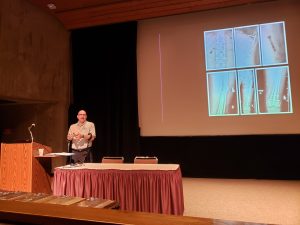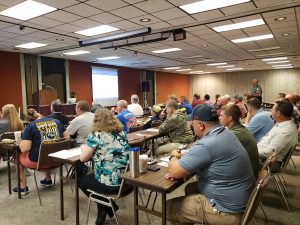InTrans / Oct 07, 2019
Summit focuses on first responders’ safety

Iowa State Patrol's Col. Nathan Fulk offers introductory comments to kick off the Midwest Traffic Incident Management Safety Summit.
Challenge accepted.
That was the attitude that Sgt. Robert Bemis brought to returning to the Pennsylvania State Police after being struck by a car in 2015, but it also sums up the attitude that needs to be brought to traffic incident management (TIM) training.
“The procedures taught in traffic incident management should be considered perishable; that is, if you don’t regularly refresh those skills and regularly remind people of why those skills are important, you’ll tend to lose your edge,” Bemis said.

Bemis, a now retired Pennsylvania State Police trooper and U.S. Marine Corps military policeman, was the keynote speaker at the Midwest Traffic Incident Management Safety Summit (MTIMSS) hosted by the Institute for Transportation (InTrans) held at Iowa State University’s Scheman Building on Sept. 30 and Oct. 1.
The summit, which is offered on a bi-annual basis, is an outgrowth from Iowa’s Statewide Multidisciplinary Safety Team (MDST) program, which is a coordinated effort between InTrans, the Iowa Department of Transportation (DOT), and the Iowa Governor’s Traffic Safety Bureau.
Along with Bemis’ tale about surviving and thriving after being hit by his own unmarked car that was struck by a vehicle while he was assisting a stranded motorist, the summit included informational booths, additional presentations on safety efforts and challenges, and a four-hour optional TIM training session.

Kurt Miene, of the Iowa DOT’s Motor Vehicle Enforcement Agency and one of the leaders of the training session, said crashes tend to be the first thing that comes to mind when people think of “traffic incidents” but it also includes flat tires and disabled vehicles. He defined a traffic incident as “anything that inhibits or changes the flow of traffic.”
The first responders who address those traffic incidents can at any time find themselves in the kind of danger that nearly took Bemis’ life. Every day, our nation’s firefighters, EMTs/paramedics, state troopers, police officers, sheriff’s deputies, tow operators, and departments of transportation responders are exposed to the grave hazards inherent in emergency responses on the nation’s highways and roadways.

Jen Knudsen, Colorado’s Traffic Safety Resource Prosecutor (TSRP) for the Colorado District Attorneys’ Council, gave two presentations about one of the current challenges facing first responders: drugged drivers. She explained the challenges her home state faces with the commercialization of cannabis but made clear that drugged driving is a growing problem in any state.
Miene, likewise, stressed that the drivers that most worry TIM responders are the “D drivers,” those who are operating vehicles while drunk, drugged, drowsy, or behaving just plain dangerously.
These new challenges are just one of the reasons that Bemis stressed the importance of continuing education when it comes to TIM.
“No matter how mundane or routine these procedures become, don’t allow yourself to become distracted away from that traffic,” Bemis said. “Force yourself to frequently break away from whatever it is you’re focused on to check that approaching traffic. I know it’s a tough balance; it really is, but the danger from passing traffic can change your life. I’m living proof.”
